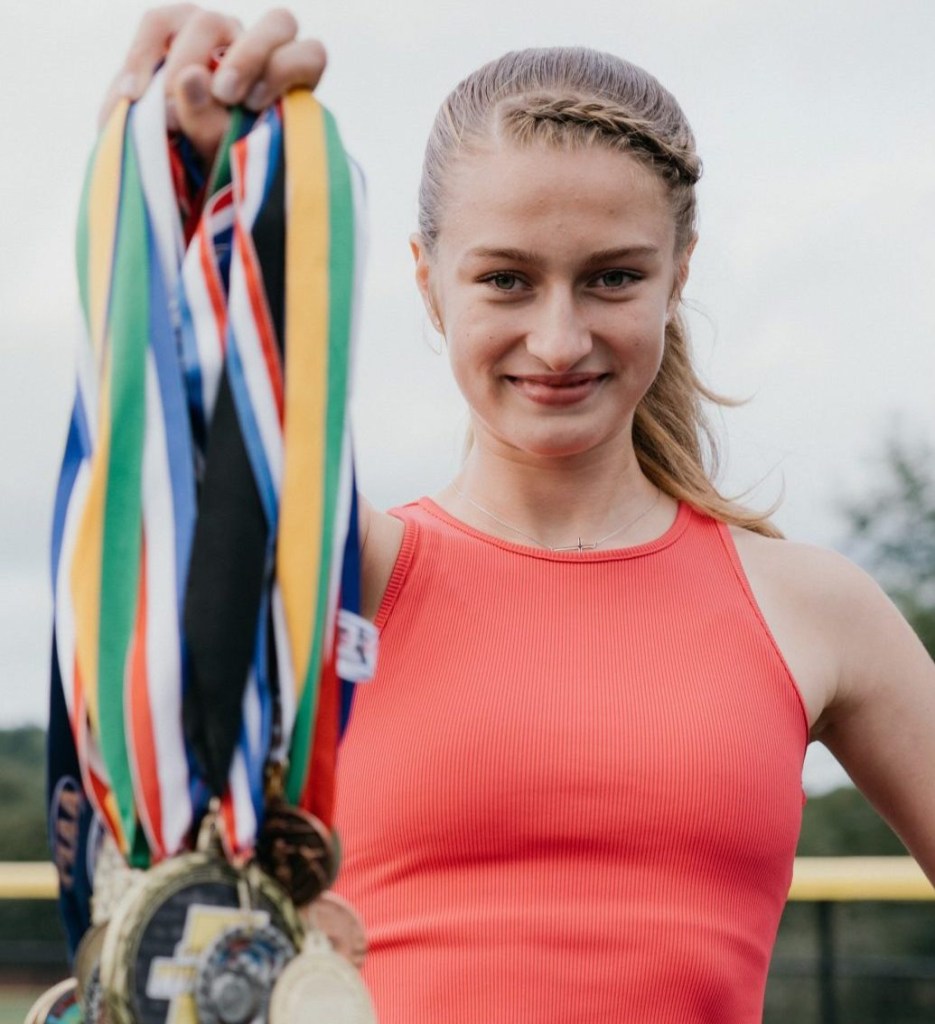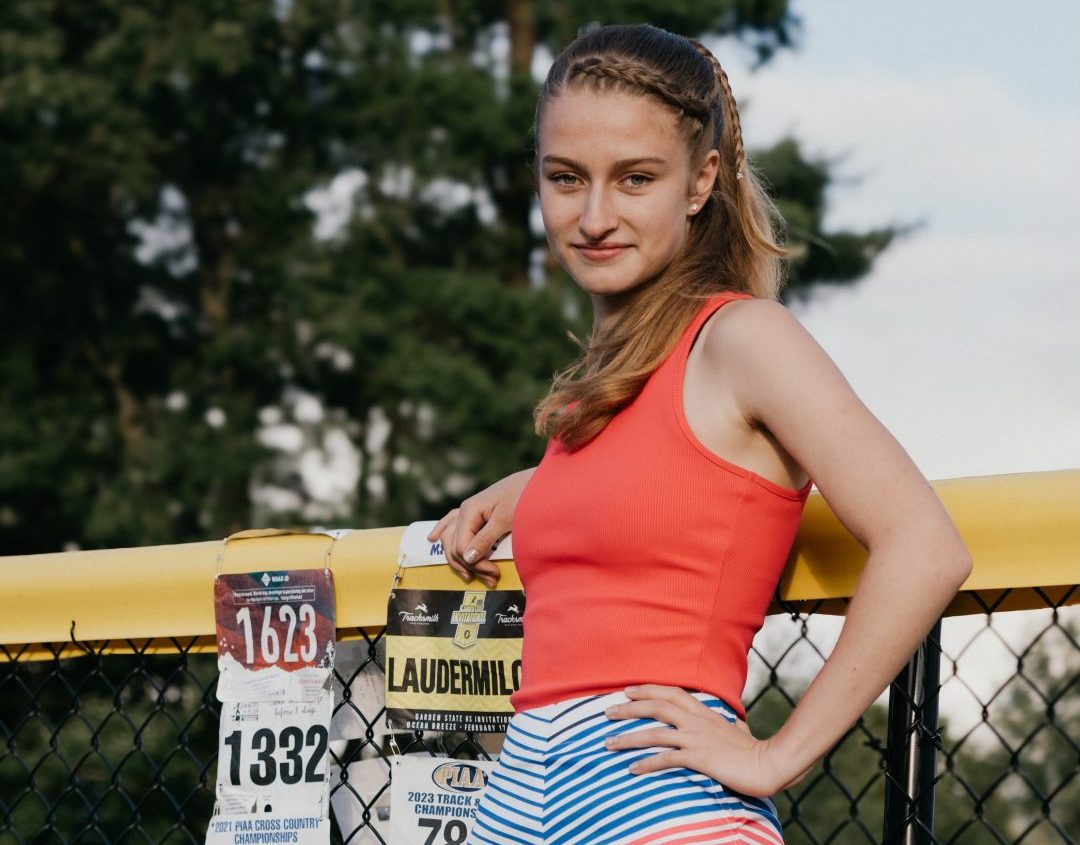Last fall, Gracelyn Laudermilch thought she had secured a spot on the track and cross-country team at the Division I school of her dreams. But late in October, the high school senior was informed she may not have a place in the program after all. The reason: new roster limits imposed by the pending House v. NCAA settlement.
Now, just a few weeks away from graduating Northeast Bradford Junior/Senior High School in Rome, Penn., Laudermilch has no idea whether she’ll have a spot on the roster next year—or where she’s going to college at all.
Unlike her classmates who sport college T-shirts and appear in celebratory posts on social media, she has nothing to wear or laud. When she’s asked about her plans for next year, she doesn’t know what to say. When she delivers a speech at graduation later this month, she won’t talk about her future. (Laudermilch declined to name the school where she’s being recruited for fear of retaliation or negative consequences of speaking out.)
Laudermilch didn’t just accept her fate, however. She filed an objection with the Northern District of California federal court in January, and has since become a voice for high school seniors who have lost promised roster spots thanks to the House settlement’s terms.
“I think I grew up a lot in the last few months,” Laudermilch, who turned 18 just days after speaking at the House approval hearing on April 7, tells Front Office Sports.
When she visited her dream school, she fell in love with the campus and her potential future teammates.
Laudermilch knew she would be competing for a scholarship—she had to hit certain times, she explains. But her roster spot was all but guaranteed: The team not only embraced her socially, but also had her do a photo shoot in the school’s uniform, anticipating her commitment announcement, adds her mother, Chelsea. “Every single box was checked and more,” Laudermilch says.
But on Oct. 31, everything changed. “I made the call to commit. And [the coach] told me, ‘You cannot commit. … I just found out four hours earlier that I have to cut half of my team,’” Laudermilch says. The coach explained she wasn’t sure what times Laudermilch would have to make in order to earn a scholarship. Laudermilch’s entire future was instantly up in the air—she had already foregone all other Division I offers.

A few weeks earlier, on Oct. 7, the House v. NCAA settlement proposal had received preliminary approval, and was up for final approval in April. If it got the rubber stamp, the settlement’s terms would take effect in 2025–2026, or Laudermilch’s freshman year.
At the time, its most well-known stipulations were related to NIL (name, image, and likeness) deals: The settlement would pay $2.8 billion in damages to D-I athletes across sports who couldn’t earn NIL money before 2021, and would establish a system of revenue-sharing among athletic departments and players. The roster limits portion received almost no attention at the time. The settlement imposed scholarship restrictions, allowing schools to offer as many as they wanted as long as they could afford them. In place of these restrictions, however, the settlement imposed roster limits to control how many players a team could recruit.
Laudermilch became one of the athletes whose roster spots were either called into question or rescinded altogether as schools prepared for the settlement’s implementation. Players and their families began to object, filing dozens of formal letters to the court as part of the settlement review process, and broadcasting their stories on social media. An account called “Save the Walk Ons” appeared on X in September; another, called “Roster Limit Objections,” appeared in February.
Laudermilch heard through a podcast that she could write an objection, she says, which she quickly composed and sent off. But she had no idea who to send it to, and it took more than a dozen emails with lawyers, lawmakers, and others to even get her letter to the court—she even had to enlist the help of the podcasters themselves. Her initial three-page objection was posted on Jan. 31, the date of the submission deadline. (Laudermilch filed her objection completely on her own; other athletes did so with the help of multiple attorneys.)
Laudermilch wrote she would be willing to object in person. “I was like, there’s no way they’re going to pick me,” she says. “Like, I’m from a super small town in the middle of nowhere. … I got Instagram for this case. I got X for this case.”
On March 17, around the time of indoor track nationals, Laudermilch received an email that she thought was spam. But it turned out to be a clerk from the Northern District of California court, asking her to confirm her appearance as an in-person objector on April 7. The list of objectors had already been released, but Laudermilch didn’t know about it.
“We just kind of stood around our [kitchen] island, like, I guess we’re going to Oakland,” she says. “I’d never been in a courtroom before. I don’t know how to talk to a judge. I had no clue what to do.” To process the job ahead, she went on a five-mile run on her favorite trail up a hill near her house. When she got to the top, she cried.
Laudermilch spent the next few weeks drafting a statement to present to the court, which she decided would focus on her own story. She had to get special permission to use the Wi-Fi at her school to work on her objection, she explains, because there’s no cellphone service and students don’t usually receive access to the internet.
On April 7, Laudermilch’s testimony was limited to just 10 minutes—she was one of several athletes speaking that day. But she, along with the other speakers, certainly made an impression. Objectors convinced Judge Claudia Wilken to issue a ruling to House lawyers that if they didn’t find a way to ensure that players wouldn’t be negatively impacted by roster limits issue, the settlement would be denied altogether.
They have since issued a solution: allowing schools to offer current athletes, as well as those in the high school senior class of 2025, the roster spots they had lost in anticipation of the settlement’s implementation.
But the new settlement makes these reinstatements optional. Even if the policy ultimately helps her get her roster spot, Laudermilch is concerned about her younger cousins and siblings, who will also be impacted by fewer roster spots in the future—as well as the health of the Olympic pipeline as a whole.
Despite the proposed solution, Laudermilch and others are still in a holding pattern. More briefs will be filed over the next few days, with the judge not slated to make a decision until the week of May 19 at the earliest. Laudermilch’s high school graduation is on May 31.
“When I walk across the stage at graduation, they’re going to say, ‘She’s going for a career in biopsychology.’ Like, that’s what they’re going to say,” she says. “There’s gonna be no school.”






![[Subscription Customers Only] Jun 15, 2025; Seattle, Washington, USA; Botafogo owner John Textor inside the stadium before the match during a group stage match of the 2025 FIFA Club World Cup at Lumen Field.](https://frontofficesports.com/wp-content/uploads/2026/02/USATSI_26465842_168416386_lowres-scaled.jpg?quality=100&w=1024)
![[Subscription Customers Only] Jul 13, 2025; East Rutherford, New Jersey, USA; Chelsea FC midfielder Cole Palmer (10) celebrates winning the final of the 2025 FIFA Club World Cup at MetLife Stadium](https://frontofficesports.com/wp-content/uploads/2026/02/USATSI_26636703-scaled-e1770932227605.jpg?quality=100&w=1024)










